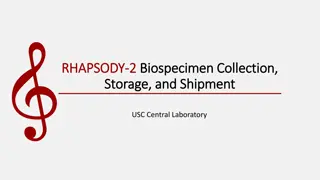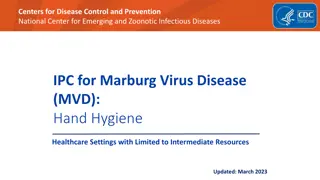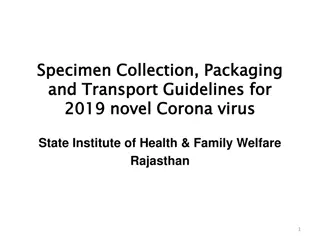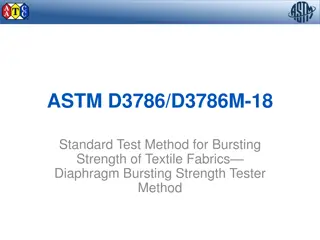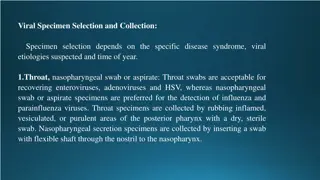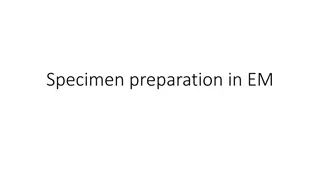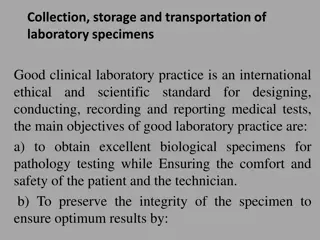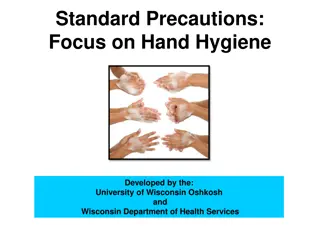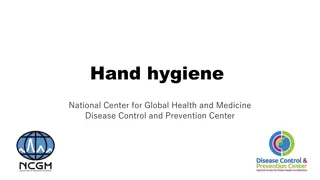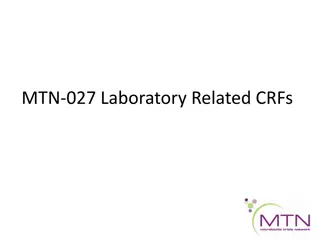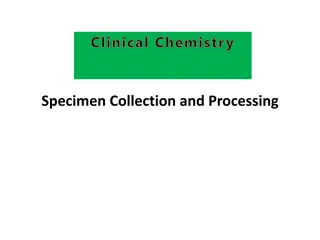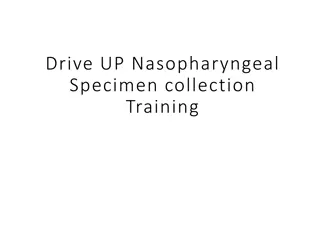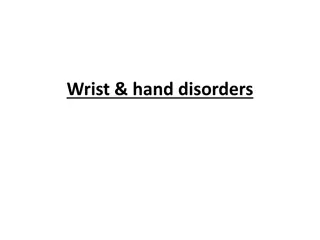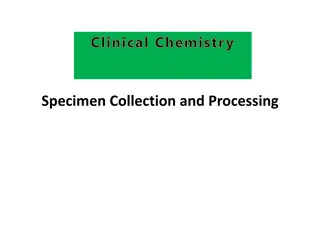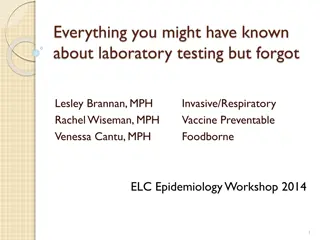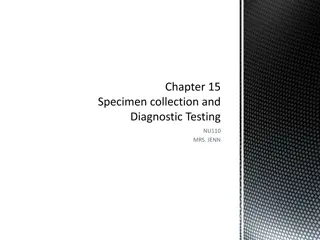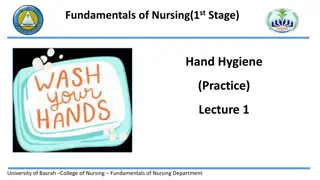Buy Kitchen Plastic Cooking Manual Hand Oil Pump (Multicolor,Pack Of 1)
Effortless Cooking Elegance: Manual Hand Oil Pump\nSimplify Your Culinary Adventures with the Kitchen Plastic Cooking Oil Pump\nIntroducing the Manual Hand Oil Pump, a versatile and efficient kitchen companion that adds a touch of elegance to your cooking routine. Crafted from durable plastic, this
0 views • 3 slides
Improving Hand Hygiene Compliance and Reducing Unnecessary Glove Use in Healthcare Settings
In healthcare settings, proper hand hygiene is crucial for infection prevention. Despite the common use of gloves, studies show low hand hygiene compliance rates when gloves are utilized, leading to cross-contamination risks. A quality improvement program aims to enhance hand hygiene compliance, inc
0 views • 13 slides
Biospecimen Collection, Storage, and Shipment Overview at USC Central Laboratory
This overview covers the types of biospecimens collected, specimen collection schedule, supplies, protocols, and shipping instructions at the USC Central Laboratory. It includes details on whole blood collection for different assays, storage procedures, and shipment to USC Labs and Charles River Lab
0 views • 21 slides
Hand Hygiene in Healthcare Settings: Importance and Guidelines
Hand hygiene plays a crucial role in preventing the spread of infections like Marburg Virus Disease. This presentation covers the significance of hand hygiene, when to perform hand hygiene, considerations for using alcohol-based hand rub, and its importance in healthcare settings with limited resour
2 views • 13 slides
Introducing ShoulderSink: Mobile Hygiene Station for On-the-Go Hand Washing
ShoulderSink is a convenient mobile hygiene station providing access to hand washing with water, soap, and sanitizer anytime, anywhere. This innovative unit is ideal for various applications like healthcare workers, teachers, soldiers, engineers, parents, and anyone on the move, especially in commun
3 views • 4 slides
Understanding Differential Leucocyte Count for Blood Disorders
Differential Leucocyte Count (DLC) is crucial for diagnosing blood-related disorders by analyzing the distribution and morphology of white blood cells. Dr. Versha Prasad explains the significance, normal values, and various conditions like neutrophilia, lymphocytosis, monocytosis, and basophilia. Th
1 views • 15 slides
Guidelines for 2019 Novel Coronavirus Specimen Collection
The guidelines outline the responsibilities of clinicians in collecting clinical specimens for testing 2019-nCoV, emphasizing the importance of following case definitions and using proper procedures for specimen collection, packaging, and transport. It also provides details on selecting patients for
0 views • 14 slides
Quality Assurance in Virology Laboratory
This chapter focuses on quality assurance in virology laboratory, covering topics such as quality control, documentation of test results, laboratory safety rules, and more. It explains the types of quality control, quality assurance cycle, and process areas of quality assurance in laboratory testing
3 views • 19 slides
Understanding Fleming's Left Hand Rule and Electric Motors
Fleming's Left Hand Rule, also known as the Left Hand Rule for Motors, explains the interaction between charged particles and magnetic fields. Electric motors utilize this principle to convert electrical energy into mechanical energy through the interaction of magnetic fields and current-carrying co
2 views • 6 slides
ASTM D3786/D3786M-18 Standard Test Method for Bursting Strength of Textile Fabrics
This standard test method, ASTM D3786/D3786M-18, specifies the procedure for determining the bursting strength of textile fabrics using a diaphragm bursting strength tester. The test involves clamping the specimen over an expandable diaphragm and applying pressure until the fabric ruptures. The burs
0 views • 16 slides
Viral Specimen Selection and Collection Overview
Specimen selection for viral testing depends on the suspected viral etiologies and disease syndrome. Throat and nasopharyngeal swabs are used for different viruses, while rectal swabs, urine, blood, and tissue samples are also collected for specific viral detection. Proper specimen transport and sto
0 views • 7 slides
Higher Reading for UAE Trees Specimen Paper Model Answers
This specimen paper provides model answers and guidance on marking your own work for a higher reading exam focusing on trees in the UAE. The questions cover various aspects such as identifying key points, analyzing language choices, and interpreting the writer's perspectives on environmental issues.
0 views • 32 slides
Understanding Specimen Preparation in Electron Microscopy
Living things cannot survive in an electron microscope due to the high temperature generated by the electron beam, vacuum inside the microscope, and need for specimen preparation steps like fixation, dehydration, freezing, cutting, and mounting. Fixation involves stabilizing tissue with chemicals, d
3 views • 10 slides
Best Practices for Clinical Laboratory Specimen Handling
Good clinical laboratory practice emphasizes the proper collection, storage, and transportation of laboratory specimens to ensure accurate and reliable test results. Key aspects include obtaining high-quality specimens, maintaining specimen integrity, and following standard precautions to prevent co
6 views • 6 slides
Common Laboratory Techniques in Zoology - Urine and Stool Specimen Analysis
In the Biology Department at Al-Mustansiriyah University, students learn laboratory techniques for collecting and analyzing urine and stool specimens. The process involves random urine sample collection, urine tests for chemical components, urine culture, stool specimen analysis for pathological con
0 views • 10 slides
Ensuring Patient Safety through Standardized Hand-Off Communications
Explore the significance of standardized hand-off processes in enhancing patient safety, as emphasized by the National Patient Safety Goals. Learn about the impact of medical errors, communication issues, and strategies for effective hand-offs. Discover how high reliability organization methodologie
1 views • 45 slides
Importance of Hand Hygiene for Preventing Infections
Understanding the importance of hand hygiene is crucial in preventing the spread of infections. This educational material emphasizes the significance of washing hands to remove harmful microbes and prevent illnesses. Through learning outcomes, curriculum links, and engaging activities like observing
0 views • 35 slides
Infection Control and Hand Hygiene Guidelines in Healthcare Settings
Learn about Standard Precautions focusing on hand hygiene to prevent the spread of communicable diseases like Norovirus, MRSA, Influenza, E. coli, and C. difficile. Understand the importance of proper hand hygiene practices in healthcare facilities, such as washing hands with soap and water, using h
0 views • 8 slides
Importance of Hand Hygiene in Healthcare Settings
Hand hygiene plays a crucial role in preventing nosocomial infections, reducing MRSA incidence, and cutting costs in healthcare facilities. Studies have shown a significant decrease in infection prevalence and MRSA cases, as well as substantial cost reductions with proper hand hygiene practices. Mon
0 views • 10 slides
Importance of Hand Hygiene in Infection Prevention
Hand hygiene is a crucial measure to prevent healthcare-associated infections (HAIs). This includes strategies to enhance compliance, comparison of available products, and adherence to current recommendations. The history of hand hygiene, risk factors for contamination, and the impact on infection t
0 views • 48 slides
Importance of Hand & Body Lotion for Skin Hydration and Nourishment
The skin loses moisture throughout the day, especially on the hands and body which are exposed to harsh conditions like frequent hand washing with drying soaps. Hand & Body lotion rehydrates and restores essential moisture, promotes elasticity, and prevents dryness and sagging. Introducing Assure Ha
0 views • 10 slides
Comprehensive Guide to Hand Hygiene in Infection Control
Hand hygiene is crucial in infection control, encompassing various methods like routine hand washing, antiseptic hand wash, and surgical hand antisepsis. Different types of hand hygiene include routine, antiseptic, and surgical antisepsis for removing or destroying bacterial infection. Indications f
0 views • 7 slides
Laboratory Related CRFs for Pharmacokinetics Study
This collection encompasses various CRFs related to laboratory procedures in the context of Pharmacokinetics for a study. It includes forms for enrollment, specimen storage, safety laboratory results, and specific days for sample collection. The CRFs detail the storage, collection, and documentation
0 views • 14 slides
Proper Clinical Chemistry Specimen Collection and Processing
Proper collection, identification, processing, storage, and transport of various types of biological specimens are crucial for obtaining accurate diagnostic test results. Different types of specimens, such as whole blood, serum, plasma, urine, feces, saliva, and various bodily fluids and tissues, ar
0 views • 18 slides
Proper Hand Washing Techniques in Anesthesiology Nursing
Dr. Kareem Waheed Abu Kheta from Al-Mustaqbal University College emphasizes the importance of proper hand washing in anesthesiology nursing to reduce the risk of transmitting infectious organisms. The lecture covers the reasons for hand washing, necessary equipment, and step-by-step instructions for
0 views • 16 slides
Developing a Pacific Community Marine Specimen Bank and Case Studies
This information paper showcases the establishment of a Pacific Community Marine Specimen Bank, focusing on the WCPFC Tuna Tissue Bank and case studies on bigeye and yellowfin tuna. The paper discusses the importance of specimen banks, ongoing projects, challenges, and key research questions regardi
0 views • 15 slides
Nasopharyngeal Specimen Collection Training
This training covers the procedures for collecting a nasopharyngeal (NP) specimen for COVID-19 testing. It includes learning objectives, roles of registered nurses and ancillary staff, proper PPE usage, step-by-step collection procedures, and handouts for participants. The training emphasizes proper
0 views • 12 slides
Metamorphic Rocks Hand Specimen Laboratory Analysis
Explore a comprehensive laboratory examination of various metamorphic rock hand specimens, identifying types of metamorphism, mineral compositions, textures, and formation conditions. Utilize images for visual aid and delve into metamorphic processes and rock characteristics.
0 views • 4 slides
Understanding Wrist and Hand Disorders: Common Conditions and Symptoms
Wrist and hand disorders encompass a range of conditions such as carpal tunnel syndrome, De Quervain syndrome, ganglion cysts, Kienbock's disease, arthritis, and hand infections. Common symptoms include pain, numbness, swelling, and difficulty gripping. Learn about the causes and treatments for thes
0 views • 13 slides
Raising Awareness of Disability Issues in Childcare and Education: Insights from Hand in Hand Foundation Hungary
Explore the journey of Hand in Hand Foundation Hungary in raising awareness of disability issues among childcare and education professionals. Discover their impactful initiatives, from teacher trainings and sensitization programs to special events and collaborations, all aimed at promoting a more in
0 views • 19 slides
Limitations of Schmidt Rebound Hammer Test
The Schmidt rebound hammer test is a quick and inexpensive method to check concrete uniformity. However, limitations include sensitivity to test surface smoothness, specimen size and rigidity, age of specimen, moisture conditions, type of coarse aggregate, type of cement, and carbonation of the conc
0 views • 5 slides
Understanding and Utilizing Engineering Hand Tools for Efficient Work
Mr. Monyane, a boiler maker lecturer, emphasizes the importance of selecting and using engineering hand tools effectively. Today's focus is on specific outcome 1: selecting and using a variety of hand tools under supervision while adhering to safety guidelines. The unit standard includes caring for
0 views • 8 slides
Promoting Hand Washing for Better Health: Knowledge, Attitudes, and Practices
Understanding the importance of hand washing is crucial for preventing the spread of germs and diseases. This content emphasizes the knowledge, attitudes, and practices related to hand washing, highlighting key factors such as when, where, and how to wash hands effectively. It delves into common att
0 views • 6 slides
Surprise Soaps Project: Promoting Hand Hygiene for Kids on Global Handwashing Day
Givaudan's Surprise Soaps Project aims to increase hand-washing frequency and engage children in hand hygiene by introducing toy animals in transparent glycerine soap. Despite challenges, the project has adapted to deliver educational activities for children in Zaatari. The project includes organizi
0 views • 5 slides
Clinical Chemistry Specimen Collection and Processing Overview
Clinical chemistry specimen collection involves obtaining blood samples for analysis. Serum and plasma are commonly used specimens, each requiring specific handling. Different anticoagulants like heparin are used to prevent blood clotting during sample processing. Heparin, a widely used anticoagulan
0 views • 15 slides
Laboratory Testing and Specimen Submission Guidelines
Comprehensive guidelines and procedures for laboratory testing, specimen submission, ordering supplies, filling out forms, CDC submissions, and packaging/shipping. Includes information on DSHS lab accounts, specimen forms, ordering supplies, and shipping protocols. Proper submission procedures and c
0 views • 77 slides
Understanding Blood Haemolysis and Specimen Rejection in Laboratory Testing
Blood haemolysis refers to the release of haemoglobin from red blood cells, affecting test results. Specimen rejection occurs due to various factors like unsuitable conditions, safety hazards, and improper labeling. Capillary puncture technique is used for patients with difficult venous access. Guid
0 views • 8 slides
Best Practices for Specimen Collection in Microbiological Examinations
Proper specimen collection is crucial for accurate microbiological examination results. Starting investigations early, avoiding contamination, and using leak-proof sterile containers are key. Important questions and considerations before collecting a specimen, along with criteria for rejecting sampl
0 views • 28 slides
Guidelines for Safe and Efficient Diagnostic Testing Procedures
This content provides detailed guidelines and procedures for specimen collection and diagnostic testing in healthcare settings, covering aspects such as patient assessment, specimen labeling, completing diagnostic requisition forms, and specific procedures like amniocentesis, arteriography, barium e
0 views • 21 slides
Importance of Hand Hygiene in Nursing Practice: A Comprehensive Overview
In this lecture from the Fundamentals of Nursing Department at the University of Basrah College of Nursing, the critical role of hand hygiene in preventing infections in healthcare settings is emphasized. Various techniques such as hand washing, antiseptic hand wash, antiseptic hand rub, and surgica
0 views • 22 slides


